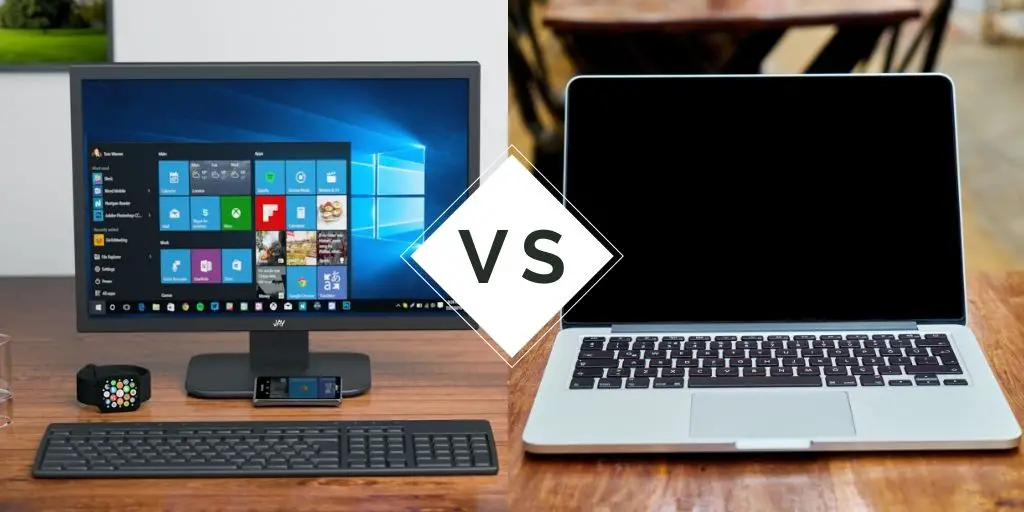When it comes to the comparison between laptop and desktops, both have their own pros and cons. If we compare the sales of both devices, laptop sales are more. But that doesn't mean you should not buy a desktop. There is handful of criteria that you should consider while deciding what to purchase, a computer or a laptop.
Let's find out which one is better by comparing these two.
1. Portability
If you are a frequent traveler and need to carry your computer with you, owning a laptop would be more beneficial. While desktops are larger and have a separate monitor, hence, not a good choice for portability. They are specifically designed to set up and use at one location and to move around very much. On the other side, the laptops are compact, hence, portable. You can easily pack it in a backpack and carry with you while travelling.
2. Peripherals
The laptop has fixed peripherals. On the one hand, it's easy to carry the laptop from one place to another but at the same time; it becomes quite difficult to replace the parts. You got stuck for the duration of its life with the same screen, keyboard, speakers, ports etc.
Laptop travel accessories could be an option but that would be a compromise with the portability. While in the case of desktop, the purchase price might be less, but you can always add extra peripherals or hardware as the technology improves. A desktop can make use of the full-size keyboards that include num pad. Smaller laptops with 14 or 15-inch screen don't feature a num pad. However, the laptops with a 17-inch screen have larger keyboards that feature a num pad on the right side but these laptops are bulky and heavy.
3. Power Consumption
Desktops require more power. There are multiple components on the computer and a monitor that needs a higher wattage power supply. If the power goes out or has fluctuations, any unsaved file that you are working on can be lost. Whereas smaller components are used in the laptops, hence, requires less power. Laptops also have a battery so there's no fear of losing the file during the power outage or fluctuations. The battery will save you.
4. Internal and External Storage
Desktops are capable of installing multiple internal drives and can be connected to multiple external drives on the available data ports. Laptops being compact can afford only one internal drive. If a user needs more internal storage, the drive needs to be replaced completely. However, it’s easy to connect multiple external drives but the ports on the laptop are less than that of a desktop.
5. Cost
A wide variety of component choices for desktops are available, allowing for a wide range of prices, but the starting point is fairly inexpensive. Desktops can start up as low as $400 for a complete package (computer & monitor) and still be very efficient.
Whereas, laptops can have a wide variety of component options, but are limited as compared to the desktops. If the user needs a powerful laptop i.e. higher speed, more storage space and high-end graphics, you need to look for the advanced models. The price for this can be possibly higher than $1000, depending on the brands.
6. Ease of Assembly
While setting up a desktop, you have to connect every part (monitor, CPU, keyboard, mouse etc.) separately. User needs to put extra effort to hook everything up before using the computer. Also, it requires more space to set up the computer. As compare to the desktop, laptops are quite easy to set up and use. It needs very little time to take it out of the box, plug it in and press the power button. The laptop is ready to use.
7. Ease of upgrading
In the case of desktop, most of the components are easy to remove, hence, making it an easy upgrade. The desktop cases are quite bigger, so while doing the upgrading it's easy to work in. While in laptops, most of the components are built-in and non-removable so upgrading becomes little tough. However, the user can upgrade the memory and hard drive. But if a user wants to upgrade any other component other than these two would be a tough job. User may require to buy a new laptop.
8. Repair
As most of the components are easy to remove, repairing becomes easier. The faulty repair can be easily purchased for replacement from any local computer retail store. User can even replace the components easily by himself. While laptops are quite tough to open for self-repairing. User needs to call the manufacturer or specialists for repair.
The Bottom Line: Both have their own pros and cons, but the final decision depends on the user requirements. Seeing the above difference you may think desktops are better. But if it's about the portability, laptops are better. Also, before choosing one out of these two you should look and compare the specifications.







